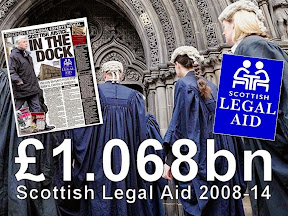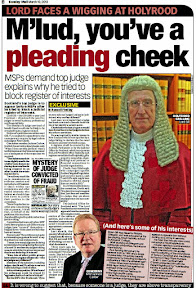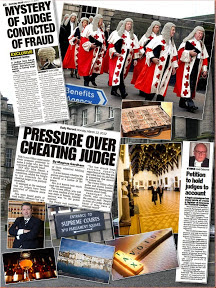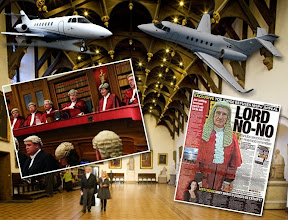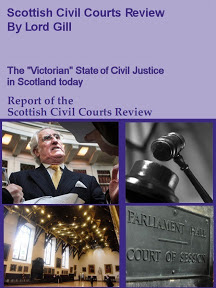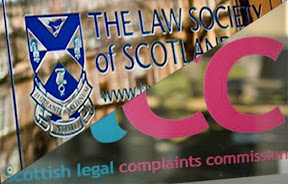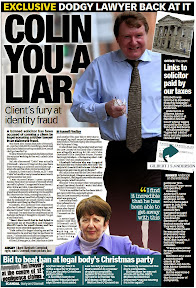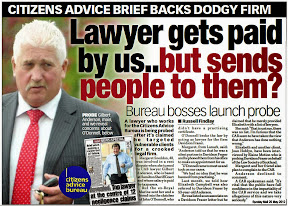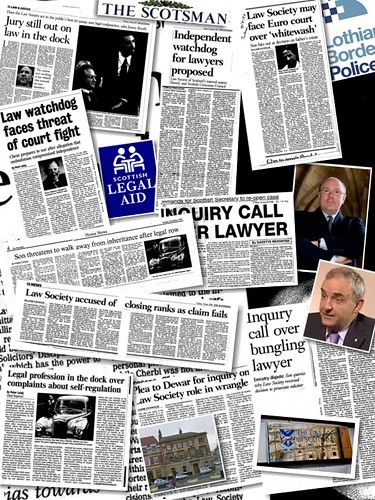Craig Murray – undated letter removed reference to bribe. DOCUMENTS obtained by the media have revealed two legal regulators acted on significantly different versions of a letter bearing the name of an Advocate who also works as a Prosecutor for the Crown Office & Procurator Fiscal Service (COPFS).
Listed in the Legal 500 Advocate Craig Murray of Compass Chambers– states on his website he represents clients in civil claims. Murray also states he works as an ad hoc Advocate Depute, prosecuting criminal trials for the Crown Office in the High Court of Justiciary.
However, an ongoing media investigation has established Advocate Craig Murray is the author of a letter to the Scottish Legal Complaints Commission (SLCC) – a letter of which two distinct versions now exist and were considered separately by legal regulators.
The investigation focuses on Murray’s role as Junior Counsel in Nolan v Advance Construction Ltd, and the conduct of legal figures in the case – spanning eight Court of Session judges – one a member of the privy Council, several Sheriffs, high profile QCs and Levy & Mcrae – the law firm identified in the £400million collapse of a Gibraltar based hedge fund – Heather Capital.
The letter was sent by Mr Murray to the Scottish Legal Complaints Commission in relation to a complaint against senior QC, John Campbell – who claims to specialise in Planning law.
Crucially, however, a significantly altered version of the letter – still bearing the name of Advocate Craig Murray as the author – removes references to ‘offers of a bribe’ to elected councillors at a Scottish local authority, and detailed references to evidence in a high value civil damages claim in the Court of Session.
Enquiries have now established the version of Murray’s letter to the Scottish Legal Complaints Commission, on the subject of found its way to the Faculty of Advocates via the law firm Clyde & Co (formerly, Simpson & Marwick) – who are known to represent members of the legal profession who are subject to complaints, allegations of dishonesty, corruption and negligence claims.
The complaint against John Campbell QC arises from his provision of legal services and representation to former National Hunt jockey & trainer Donal Nolan, who was the pursuer in – Nolan v Advance Construction Ltd – a case which is now likely to be heading to the UK Supreme Court for an appeal.
Questions have now arisen regarding extensive differences between the two versions of the letter, addressed to the Scottish Legal Complaints Commission. Both versions of the same letter bear Craig Murray’s name as author.
Significantly, certain references to allegations of bribery involving employees of a construction company and elected councillors, have been altered in a second version of Mr Murray’s letter – which bears no date.
Advocate Craig Murray’s letter to SLCC (Text marked in pink shows extent of deletions in Faculty’s version). In a letter dated 22 July 2014 to the SLCC, Craig Murray writes: “The most accurate account of Councillor Taggart’s position will be in that statement. My recollection of Ms Moore’s summary is that a person, whose identity was unknown to Mr Taggart, telephoned him about this case and offered a bribe. There was nothing to identify that person or connect that person to the defenders.”
However, the second version of the letter, has the references to bribery removed from the end of the sentence.
The undated letter still bearing Craig Murray’s name and Advocates address, then reads: “The most accurate account of Councillor Taggart’s position will be in that statement. My recollection of Ms Moore’s summary is that a person, whose identity was unknown to Mr Taggart, telephoned him about this case. There was nothing to connect that person to the defenders.”
Then, both versions of the letter from Craig Murray to the SLCC continue: “An allegation that the defenders had been involved in bribing an elected public official to commit perjury in court would have been extremely serious. There was no basis upon which an allegation of that sort could have been made by a responsible solicitor or advocate. There could also be no further investigation (particularly in the midst of the proof diet) as it was not known who made the telephone call.”
Councillor John Taggart – who is referred to by Murray, was interviewed late last week.
Councillor Taggart’s role in discovering the dumping of contaminated waste by Advance Construction Ltd, and his further efforts to assist Mr Nolan, and constituents affected by events, was crucial in bringing the case to court and into the public eye.
In discussions with a journalist, Councillor Taggart made clear in his own view, the evidence in relation to the offer of an inducement related to an event occurred at the opening of Calderbridge Primary School (former site of Coltness Primary School), and NOT in a telephone conversation as Mr Murray claimed in his letter to the SLCC.
Further, Councillor Taggart indicated the “person, whose identity was unknown to Mr Taggart” – according to Craig Murray’s statement, had in fact handed his business card to the Councillor during the school opening event.
The Councillor further alluded to the identity of the person as an employee of a main contractor for North Lanarkshire Council.
It has since been established both Advocate Craig Murray, and Fiona Moore of Drummond Miller were present with the Councillor when his precognition of evidence was taken.
Further enquiries by journalists have now revealed the person who allegedly offered the inducement is an employee of a major construction contractor on North Lanarkshire Council’s list of approved contractors.
When it became known the incident involving the inducement was to be used in evidence, the person who approached the councillor left Scotland for Ireland and did not return for a number of months – despite being cited as a witness to attend court to give evidence in the Nolan v Advance Construction Ltd case.
The record later shows – John Campbell QC – failed to call the witness even though the individual alleged to have offered the inducement to the councillor appears on the final witness list for the proof hearing before Lord Woolman in 2014..
If the evidence of bribery had emerged during lines of questioning at the Court of Session, the testimony may well have had a significant impact on the case, and most probably initiated a Police Scotland investigation into the companies involved, and North Lanarkshire Council.
However, Senior Counsel for Mr Nolan – John Campbell QC – chose not to introduce the conversation about the allegations of bribery in court.
Undated & altered version of Advocate Craig Murray’s letter to SLCC. The removal of references to a bribe, and swathes of material removed from the second, ‘undated’ version of Craig Murray’s letter to the SLCC – raises further questions over the written testimony offered by the Advocate & some time Prosecutor to the Scottish Legal Complaints Commission.
Curiously, the undated version of Murray’s letter then surfaces at the Faculty of Advocates – who chose to rely on this heavily altered version of Murray’s original letter – in relation to an investigation which ultimately dismissed the complaint against John Campbell QC.
In a letter dated 7 October 2015 from the Faculty of Advocates to Melanie Collins, Iain WF Fergusson QC confirmed the Faculty of Advocates preferred the lesser content of the undated letter to be used in the complaint against the QC.
Fergusson wrote: ”The earlier of your two e-mails refers to two versions of a letter by Mr Craig Murray, Advocate to the SLCC. The committee relied on the undated version of the letter as support for Mr John Campbell QC’s version of events. This has brought to light an administrative error – the version of the letter dated 22 July 2015 was not before the committee when it considered and determined your complaint”
In a letter of 2 May 2016 to the Scottish Legal Complaints Commission, law firm Clyde & Co – acting as legal agent for John Campbell QC against the complaint attempted to explain the discrepancy between the two versions of Craig Murray’s letter and how the undated version ended up at the Faculty of Advocates.
Anne Kentish, of Clyde & Co wrote: “We have reviewed our files and have ascertained the sequence of events surrounding the letter. When the complaint was originally made against Mr Campbell, we were provided with a copy of the undated version of the letter from Craig Murray to the SLCC. It was provided to us on the basis that it set out the background to the complaint and Mr Murray’s recollection of events.. We did not, at that time appreciate that the letter was in draft. It resembled a file copy letter.”
“When senior counsel for Mr Campbell, Alistair Duncan QC prepared the response to the complaint on behalf of Mr Campbell, he indicated that Mr Murray’s letter to the SLCC should be included in the appendix to the response. When we prepared the appendix, we used the version of the letter that we had within our files which was the undated version. We did not at that time appreciate that the final, dated version, existed.”
“Later that day, Mr Duncan forwarded to us some emails which happened to have the dated version of the letter attached. We understand that Mr Duncan had been provided with the final version of the letter by Mr Murray. Neither we nor Mr Duncan realised that we were working from slightly different versions of the same letter (one being a draft and one being a final version)”
“As soon as we realised a final dated version of the letter existed (the day after the response was submitted to the Faculty) we provided Faculty with the final dated version of the letter and asked it to replace the undated version.”
“Mr Murray has confirmed that the undated version is a draft version of the final version dated 22 July 2014.”
However, the lengthy and laboured explanation from Clyde & Co to the Scottish Legal Complaints Commission, and the email from Iain Fergusson QC are completely at odds with a written explanation provided by Advocate Craig Murray to Mr Nolan’s partner, Ms Collins.
Seeking to explain the situation regarding his letter, an email dated 23 June 2015 from Craig Murray to Mr Nolan’s partner, Melanie Collins, stated the following: “I finished writing this letter on 22 July 2014. I signed it and sent it to the SLCC that day. Copies were also sent to you and to John Campbell QC. I did not submit one to the Faculty of Advocates, nor did any Office-bearer or member of Faculty staff see the letter before it was sent (or for that matter have I passed a copy to any Office-bearer or member of Faculty staff since). I do not know how the Faculty of Advocates came to have a copy of the letter. Could you possibly provide me with a copy of the letter or email from the Faculty of Advocates, enclosing my copy letter?”
“I note that you have provided two copies of the letter. One is dated 22 July 2014 and has page numbers and footnotes. That is the letter I submitted to the SLCC and copied to you. The letter you have labelled 5B has no date, no page numbers and no footnotes. This letter is not in a form which I saved on my computer or sent to anyone else. It appears to have the same content, font and (roughly) layout as the dated version, but I have not checked on a line-by-line basis.”
It is unusual for such material to be made public as papers submitted to the SLCC remain unreleased due to confidentiality rules.
However, the papers have been made available to journalists who are investigating the litigation process of Nolan v Advance Construction Ltd – after the case was brought to the attention of MSPs at the Scottish Parliament.
And, given the author of the letter – Craig Murray also works as an ad hoc Advocate Depute prosecutor in Scotland’s courts, there are now concerns over the implications of a Prosecutor being identified in various versions of the same letter, one version of which contains alterations to witness testimony in relation to criminal acts, and references to evidence in what has now become a key case of judicial failures to recuse, and accusations of bias in the courts.
Late last week, the Crown Office was asked for comment on the matter and the impact on Murray’s role as a prosecutor.
Initially, the Crown Office refused to comment, and demanded any request for media reaction be put in the form of a Freedom of Information request.
Pressed on the matter, a spokesperson for the Crown Office then suggested: “..as Mr Murray is not a COPFS employee any request for formal comment in relation to his professional conduct as an Advocate should be submitted to Mr Murray himself, the Dean of the Faculty of Advocates or the SLCC. Any allegations of criminal conduct should be raised with Police Service of Scotland.”
However, there are clearly public interest questions in relation to a prosecutor named as the author of a letter where one version, used by a law firm with direct connections to the judiciary – removed evidence in relation to criminal acts and bribery.
The Crown Office was then asked if the Lord Advocate intends to act to protect public confidence in the Crown Office and Procurator Fiscal Service by ordering an investigation into the use of altered versions of Mr Murray’s letter to the SLCC, and act on the status of Mr Murray as an Advocate Depute.
No reply was received.
However, it has since been established, the Dean of the Faculty of Advocates during the sequence of events which saw the Faculty investigation into John Campbell – is the current Lord Advocate James Wolffe QC.
As part of his current role as Lord Advocate – James Wolffe QC now oversees cases Craig Murray prosecutes while acting as an ad hoc Advocate Depute.
Earlier this month, DOI revealed a judge took part in a case on no less than eight occasions, where his son acted as a solicitor for the defenders. No recusal was ever recorded in this case by the judge – Lord Malcolm, who’s son Ewen Campbell had acted for the defenders – Advance Construction Ltd. The article featured here: Papers lodged at Holyrood judicial interests register probe reveal Court of Session judge heard case eight times – where his son acted as solicitor for the defenders
Additionally “The National” newspaper carried an exclusive investigation into the Nolan V Advance Construction Ltd case, here: Couple’s human rights breach claim raises questions about how judicial conflicts of interest are policed. The newspaper’s investigation revealed there are moves to take an appeal to the UK Supreme Court at a date to be decided.
Papers now under consideration by journalists for upcoming publication, are set to reveal allegations a legal team – of which Mr Murray was a member – received disbursements from a senior QC from funds the QC obtained after demanding and personally collecting substantial cash sums of thousands of pounds from clients.
The payments – outwith the normal procedure of paying advocate’s fees via a solicitor and to faculty services – are under investigation by journalists due to concerns in relation to irregularities and potential tax avoidance issues.
Craig Murray was contacted for his comments on material handed to the press.
Craig Murray was asked why there were significant differences between two versions of his letter to the Scottish Legal Complaints Commission, one dated, the other undated.
Craig Murray refused to comment.
Craig Murray was asked to confirm if his letter was altered by someone other than himself.
Craig Murray refused to comment
Craig Murray was asked if he was aware of Lord Malcolm’s true identity (Colin Malcolm Campbell) and his relationship to solicitor Ewen Campbell, one of the legal agents working for the defenders.
Craig Murray refused to comment.
Lastly, Craig Murray was asked to comment on both versions of the letter he sent to the Scottish Legal Complaints Commission. He was asked which one he wrote and if he was aware anyone altered the second undated version of his letter.
Craig Murray refused to give any comment.
A billing document from Craig Murray’s Compass Chambers to the client, reveals he was to be paid £800 +VAT per day for proof preparation and £1,250 + VAT per day for Court, which ran to 8 days. A bill was subsequently received from Mr Murray’s stables for around £39,000.
It has since been established, the SLCC relied on the dated version of Murray’s letter, while the Faculty of Advocates relied on the heavily altered undated version of Murray’s letter regarding their consideration of a complaint against John Campbell QC.
Papers obtained from case files and published in this investigation confirm the undated version of Craig Murray’s letter appears to have originated from the Edinburgh law firm – Clyde & Co (formerly Simpson & Marwick).
The letter from Clyde & Co also confirms the undated version of Murray’s letter was sent to the Faculty of Advocates, on the instructions of Alistair Duncan QC.
Duncan was tasked with defending John Campbell QC in relation to the complaint being considered the Scottish Legal Complaints Commission.
However, Court papers record the same Alistair Duncan QC – who was now defending John Campbell QC, once appeared for the defenders against Mr Nolan – in the Nolan v Advance Construction case – on 9 November 2011.
Late yesterday, the Scottish Legal Complaints Commission was provided with the two versions of Craig Murray’s letter, and a copy of a letter from Clyde & Co, admitting their role in providing the second, undated version with alterations to the Faculty of Advocates.
The Scottish Legal Complaints Commission was asked for a statement on the existence of the two versions of Craig Murray’s letter and what action the regulator intends to take.
The SLCC refused to comment.
However, the SLCC confirmed a meeting had taken place between their Chief Executive – Neil Stevenson – and former Cabinet Minister Alex Neil MSP – who has provided powerful backing for his constituent – Donal Nolan.
A spokesperson for the SLCC said: “I can confirm that a meeting between our CEO and Alex Neil MSP took place. The meeting was to discuss the SLCC’s process: what powers we have; actions we can take; and what we can’t do.”
The case has now been brought to the attention of the Scottish Parliament’s Public Petitions Committee – who are probing judicial interests, failures of judges to recuse over conflicts of interest, and opposition of Scotland’s current Lord President – Lord Carloway – to calls for the creation of a register of judicial interests.
Had a comprehensive and publicly available register of judicial interests existed at the time of the Nolan v Advance Construction Ltd case, details of judicial links in the register could have prevented injustice in the Nolan case – and many others in the courts – from the very outset.
PROFILE: Craig Murray – Personal Injury specialist & Ad hoc Advocate Depute, of two letters:
Craig Murray – Year called: 2008
Qualifications: LLM in Commercial Law (Distinction),University of Edinburgh Member, Chartered Institute of Arbitrators Faculty Scholar, Faculty of Advocates LLM in Human Rights Law, University of Strathclyde, Dip Forensic Medical Sciences, Society of Apothecaries, Dip Legal Practice, University of Edinburgh LLB (Hons), University of Edinburgh.
Craig has a busy defender personal injury practice in the Court of Session, representing insurers and local authorities. A substantial practice part of his practice is in defending fraudulent claims at all levels, in particular employers’ liability cases and road traffic claims.Craig also represents claimants in medical and dental negligence claims.
Craig has been instructed in a number of complex product liability cases, including pharmaceutical cases (Vioxx and Celebrex) and medical products (mesh surgical implants and PIP silicone implants).
Craig has substantial experience in property damage claims and other aspects of reparation.Craig occasionally acts in public law and human rights cases, including judicial review, mental health appeals and immigration.Craig has previously been a tutor on the Diploma in Regulatory Occupational Health & Safety at the University of Warwick and on the Civil Court Practice course at the University of Edinburgh.
Craig was appointed as an Advocate Depute ad hoc in July 2015. He is a member of the Children’s Panel for the Scottish Borders.
Among references to recent cases listed on Craig Murray’s profile is Nolan v. Advance Construction [2014] CSOH 4, a land contamination case in the Commercial Court, with senior counsel.


























